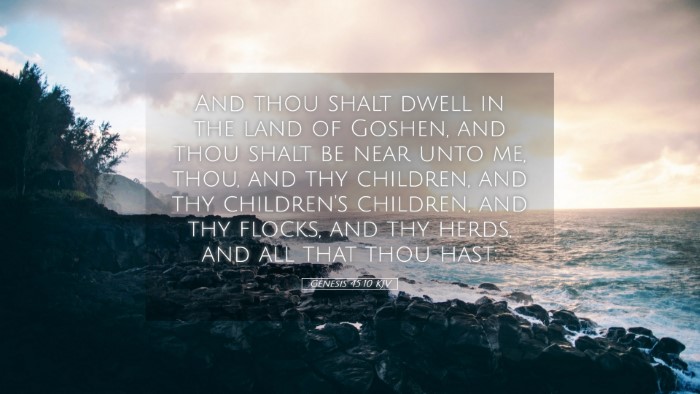Commentary on Genesis 45:10
Verse Context: Genesis 45:10 states, “And thou shalt dwell in the land of Goshen, and thou shalt be near unto me, thou, and thy children, and thy children’s children, and thy flocks, and thy herds, and all that thou hast.” This passage occurs in a pivotal moment when Joseph reveals his identity to his brothers and invites them to live in Egypt during the famine.
Overview of the Passage
This verse encapsulates the reconciliation of Joseph with his brothers and highlights the themes of community, provision, and familial bonds amidst adversity. The express invitation to live in Goshen signifies not just physical proximity but also emotional restoration and the strengthening of familial ties.
Insights from Public Domain Commentaries
Matthew Henry's Commentary
Matthew Henry emphasizes the significance of Joseph's initiative to bring his family to Egypt. He notes that Goshen, being a fertile area, represents a place of sustenance amid scarcity. Henry reflects on the spiritual implications of this passage, suggesting that God’s provision is evident in Joseph's offer, exhibiting divine foresight and mercy.
- Henry points out that Joseph’s desire for closeness with his family symbolizes the importance of unity and support among believers.
- He also highlights the fact that Joseph’s honoring of his family, despite past grievances, illustrates the themes of forgiveness and reconciliation central to the biblical narrative.
Albert Barnes' Commentary
Albert Barnes places significant focus on the geographical and cultural context of Goshen. He explains that this land, situated in the Nile Delta, was known for its rich resources, which catered to the needs of Joseph’s family during the famine. Barnes interprets this as God’s providential care in ensuring that Jacob's lineage would thrive in a time of crisis.
- Barnes asserts that Joseph's offer to his family reflects not only a physical deliverance but a spiritual promise: to be secure and blessed within God's plan.
- He elaborates on the importance of familial sanctity and reintegration, as Joseph’s actions serve to restore familial relationships broken by past actions.
Adam Clarke's Commentary
Adam Clarke offers a detailed exposition of the terms used in the verse and their implications. He reflects on the emotional weight of Joseph inviting his family to stay near him—this invitation symbolizes not just sustenance of life but the continuity of family history and legacy. Clarke emphasizes that Goshen serves as a safe haven, indicative of God’s providence in difficult times.
- Clarke highlights that the factors of love, familial responsibility, and community care are prevalent in Joseph’s invitation, which resonates deeply with pastoral care today.
- He also notes the larger theological themes, arguing that even in dire circumstances, God’s plan unfolds in ways that ensure the preservation of His people.
Theological Implications
The invitation to dwell in Goshen carries profound theological implications. It presents a clear picture of God’s provision for His people, which can inspire theological reflection on various themes:
- God’s Provision: The invitation signifies God’s provision in times of need, reminding believers that even in periods of trial, God is attentive to the needs of His people.
- Reconciliation and Forgiveness: The nurturing of familial ties post-conflict serves as an encouragement for pastors and theologians to emphasize forgiveness and the renewal of relationships.
- Divine Sovereignty: Joseph’s rise to power and his proactive approach to sharing resources illustrate God’s sovereignty in using human actions to fulfill divine purposes.
- Community in Crisis: The act of gathering Joseph's family highlights the importance of community support and solidarity, especially in challenging times.
Practical Applications
This passage encourages meaningful reflection for pastors, students, and theologians in various ways:
- Encouragement in Ministry: Pastors can draw on the example of Joseph who, despite personal hardship, seeks to uplift his family, fostering a spirit of care and community in their congregations.
- Emphasis on Forgiveness: This narrative illustrates the necessity and potential of reconciliation, prompting church leaders to promote forgiveness within their communities.
- Faith in Provision: Students and scholars may find in this passage a profound understanding of divine provision, reminding them to trust in God’s plans when faced with uncertainty.
- Building Familial Bonds: The reaffirmation of familial ties serves as a model for congregations to strengthen community bonds and foster a familial spirit among members.
Conclusion
Genesis 45:10 not only narrates a historical event but also serves as a rich source of theological insight, reflecting God’s unwavering provision, the importance of family, and the power of reconciliation. Combining insights from prominent commentaries, this analysis serves to equip pastors, students, and theologians with perspectives that illuminate the depth of Scripture, fostering a greater understanding of God's enduring promises for His people.


